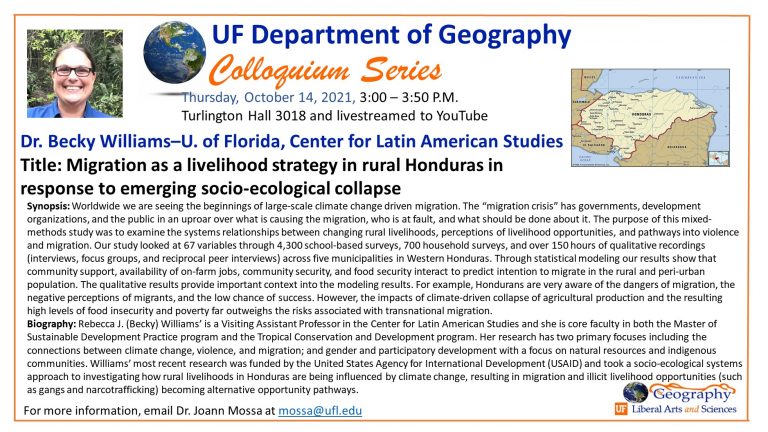Speaker: Dr. Rebecca J. Williams
Visiting Assistant Professor
Center for Latin American Studies
Master of Sustainable Development Practice Program
Tropical Conservation and Development Program
University of Florida
Thursday, October 14, 2021
2:50-3:50 PM (Period 8)
Turlington Hall 3018 and Zoom
University of Florida
Synopsis: Worldwide we are seeing the beginnings of large-scale climate change driven migration. The “migration crisis” has governments, development organizations, and the public in an uproar over what is causing the migration, who is at fault, and what should be done about it. The purpose of this mixed-methods study was to examine the systems relationships between changing rural livelihoods, perceptions of livelihood opportunities, and pathways into violence and migration. Our study looked at 67 variables through 4,300 school-based surveys, 700 household surveys, and over 150 hours of qualitative recordings (interviews, focus groups, and reciprocal peer interviews) across five municipalities in Western Honduras. Through statistical modeling our results show that community support, availability of on-farm jobs, community security, and food security interact to predict intention to migrate in the rural and peri-urban population. The qualitative results provide important context into the modeling results. For example, Hondurans are very aware of the dangers of migration, the negative perceptions of migrants, and the low chance of success. However, the impacts of climate-driven collapse of agricultural production and the resulting high levels of food insecurity and poverty far outweighs the risks associated with transnational migration.
Biography: Rebecca J. (Becky) Williams is a Visiting Assistant Professor in the Center for Latin American Studies and she is core faculty in both the Master of Sustainable Development Practice program and the Tropical Conservation and Development program. Her research has two primary focuses including the connections between climate change, violence, and migration; and gender and participatory development with a focus on natural resources and indigenous communities. Williams’ most recent research was funded by the United States Agency for International Development (USAID) and took a socio-ecological systems approach to investigating how rural livelihoods in Honduras are being influenced by climate change, resulting in migration and illicit livelihood opportunities (such as gangs and narcotrafficking) becoming alternative opportunity pathways.
All are welcome to attend.
For more information, email Dr. Joann Mossa at mossa@ufl.edu
